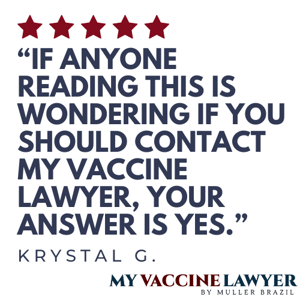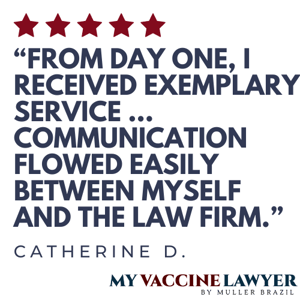SIRVA TREATMENT, SIRVA SYMPTOMS & DIAGNOSIS
.jpg)
SIRVA
After receiving a vaccination, the experience of a sore upper arm is a familiar occurrence. A slight tenderness at the injection site often accompanies the body's immune response to the vaccine components.
While this discomfort is generally short-lived and benign, a more obscure concern emerges in the form of Shoulder Injury Related to Vaccine Administration (SIRVA).
Although rare, SIRVA injuries have gained attention in recent years. According to a study published in the December 2022 journal Exploratory Research in Clinical and Social Pharmacy, 505 SIRVA cases have been reported since 2017, with a notable spike of 65% of cases between January and July 2021 alone. It's important to recognize that while the risk of SIRVA injury is small, individuals should not be dissuaded from the vital act of vaccination. Instead, understanding the potential SIRVA symptoms is a proactive step towards seeking timely assistance, ensuring individual well-being and the broader community's health.
Hear Cheryl's Vaccine Injury Story
Cheryl suffered SIRVA (shoulder injury related to vaccine administration) following a flu shot. Her vaccine injury claim was filed in the VICP by vaccine lawyer Max Muller where she obtained a large cash settlement for her pain and suffering, lost wages and out of pocket medical expenses.
What is SIRVA?
SIRVA, which stands for Shoulder Injury Related to Vaccine Administration, is a condition arising from improperly injecting a vaccine into the shoulder.
Unlike vaccine-related effects, SIRVA is caused by injection placement rather than vaccine content. This condition impacts the shoulder's mobility-enhancing components, leading to enduring and severe discomfort. Characterized by intense and prolonged pain, SIRVA highlights the significance of accurate vaccine administration for maintaining comfortable arm movement.
What are the symptoms of SIRVA?
The primary SIRVA symptoms become evident within 48 hours of vaccine injection, commonly presenting as abrupt pain in the deltoid muscle or restricted arm movement. This discomfort ranges from a persistent dull ache to sharp shooting pains, potentially radiating from the shoulder down the arm during rest and movement. Additional indicators encompass tingling or numbness in the arm, swelling, stiffness, and weakness, possibly accompanied by limited shoulder mobility. Alarmingly, SIRVA's consequences can extend to chronic pain or even long-term disability, underscoring the importance of swift recognition and treatment to mitigate potential complications.

4,500
1,750+
5 Stars
How can a vaccine cause SIRVA?
What does SIRVA feel like? When you receive a flu shot or other common vaccine, you may experience normal soreness in your shoulder.
But if this pain is severe or prolonged, it could be a sign you have a more severe shoulder injury and need SIRVA treatment. Vaccines are commonly administered in the deltoid muscle of the shoulder. However, improper techniques, such as using a needle that's too long or injecting the vaccine too high on the arm, can lead to accidental contact with the bone or the fluid-filled bursa sac that safeguards shoulder tendons. This impact can result in inflammation of the bursa, tendons, and ligaments, triggering pain within the deltoid muscle.

How is SIRVA diagnosed?
And how to treat SIRVA.
Swift medical attention is essential when experiencing SIRVA symptoms. Diagnosis involves a physical examination by a physician, potentially accompanied by tests to pinpoint shoulder inflammation or injury.
It's vital to disclose the recent vaccination, as symptoms should arise within a defined post-vaccination period and exclusively affect the inoculated shoulder. A crucial aspect of diagnosis is eliminating alternative explanations for the condition, further highlighting the vaccine's role.
By collaborating with healthcare providers and emphasizing the temporal connection between symptoms and vaccination, individuals can ensure an accurate SIRVA diagnosis and appropriate management.
What shoulder injuries may be attributed to SIRVA?
A SIRVA injury can manifest in different ways. The following is a list of the typical injuries that may be attributed to SIRVA:
- Bursitis: Bursitis is inflammation of the bursa, a fluid-filled sac that cushions and reduces friction between bones, tendons, and muscles in the joint. In the context of SIRVA, bursitis can occur if the vaccine needle punctures or irritates the bursa, leading to pain, swelling, and limited shoulder movement.
- Frozen Shoulder: Also known as adhesive capsulitis, frozen shoulder thickens and tightens the capsule surrounding the shoulder joint. SIRVA can contribute to this condition due to inflammation and subsequent scar tissue formation, resulting in pain and stiffness that restricts shoulder movement.
- Rotator Cuff Injury: The rotator cuff is a group of tendons and muscles that stabilize and enable shoulder joint movement. SIRVA-induced injury to the rotator cuff can lead to pain, weakness, and limited range of motion. Unlike SIRVA, a typical rotator cuff injury may result from overuse, trauma, or degeneration.
- Shoulder Tendonitis: Tendonitis is the inflammation of a tendon, the tissue connecting muscles to bones. In SIRVA, improper vaccine injection can inflame the shoulder tendons, causing pain, tenderness, and difficulty moving the arm. General shoulder tendonitis can also result from repetitive motion or strain.
- Ulnar Neuropathy: Ulnar neuropathy refers to damage or compression of the ulnar nerve, which runs from the neck to the hand through the arm. While SIRVA doesn't typically involve nerve damage, the condition can indirectly contribute to ulnar neuropathy if inflammation or swelling affects the nerve's pathway, leading to symptoms like tingling, numbness, and weakness along the arm and hand.
What is the treatment for SIRVA?
SIRVA treatment encompasses both surgical and non-surgical options. Non-surgical approaches often include rest, physical therapy, and anti-inflammatory medication to alleviate pain and inflammation. In severe cases, surgical interventions might be considered to address specific shoulder issues that arose from the improper vaccine injection, aiming to restore normal shoulder function and alleviate persistent discomfort.
How can I seek compensation for SIRVA from a vaccine?
If an individual experiences a shoulder injury due to a vaccine, seeking compensation is possible via the Vaccine Injury Compensation Program SIRVA (VICP). The government has awarded substantial compensation through VICP for SIRVA injuries linked to specific vaccines. Compensation could encompass medical cost reimbursement, applicable wage loss, and reparation for pain and suffering, helping those affected to navigate the challenges posed by this unexpected injury. Our team of skilled experts at My Vaccine Lawyer specializes in guiding SIRVA cases and provides complimentary case assessments. Start your road to recovery by contacting My Vaccine Lawyer today!
Don't worry, we're here to help.
6 min read
Can I Get a Flu Shot if I Have a Cold? Expert Advice on Vaccinations & Mild Illness
Feb 8, 2024 by Paul Brazil
5 min read
How Long After The Flu Shot Does Guillain-Barré Syndrome Develop
Jan 29, 2024 by Paul Brazil


